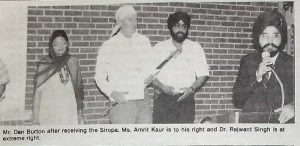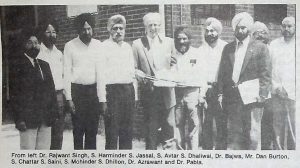

WASHINGTON: Congressman Dan Burton of Indiana, the keynote speaker at a function commemorating the 150th death anniversary of Shere Punjab, Maharaja Ranjit Singh, deplored the Repression of the Sikhs in Punjab by the Indian Government. Mr Burton recently sponsored a special order in the US Congress to urge restoration of human rights of the Sikhs.
At the well-attended function organized by the Guru Gobind Singh Foundation Mr Burton said
the Indian Government’s treatment of the Sikhs is the most extreme example of the way Prime Minister Rajiv Gandhi does business.
Mr Burton said’ he was getting reports all along from the Indian Government denying human’ rights abuses, “That is a bunch of poppycock that is a work that means lies”
Ina 90 minute address he went on to flay India for the export of chemicals to Iran, Iraq and’ Egypt to be used in the manufacture of poison gas.
India had charged’ the US of ‘colonialism’ when asked to exercise restraint in the chemicals export, he said.
He also said that as a member of the House Human Rights Caucus, he had been informed by the then US ambassador to the UN, Mr Vernon Walters that India had constantly blocked US efforts urging the US Human Rights Commission to Censure Cuba for alleged human rights abuses,
Mr Burton also attacked India’s refusal to condemn the Soviet invasion of Afghanistan and its ties with the puppet Soviet regime in Kabul.
He said, “There are those who think the Indian Government may have had a hand in bombing the plane that killed General Zia and our ambassador.” Mr Burton also brought up the allegation in ‘Soft Target’ by Zuhair Kashmiri and Brian McAndrew that Indian intelligence was behind the bombing of the Air India jet off Ireland in 1985. He said some in Congress
have been mislead by the propaganda put out by Mr Gandhi.
Dr Madanjit Kaur of the Guru Nanak Dev University, Amritsar presented a documented study on the contributions and achievements of Maharaja, Ranjit Singh.
She pointed out that Ranjit Singh successfully established a benevolent monarchy based largely on Sikh traditions and theory of trusteeship of Kingship. He was fully aware of the Sikh political ideology and the concept of the Sikh rule generated by Banda Singh Bahadur and the Misil Sardars as well as the requirements of his time,
Although Ranjit Singh assumed the title of the Maharaja, he Struck coins in the names of the Gurus and never sat on a throne or worea crown. His govt. was called “Sarkar Khalsa’ The structure of his administration set up, cabinet and beauracracy; consideration of merit was criteria of recruitment in his Civil Services and army; his Patronage to men of letters and artisan respective of their religious confirmation of Jagirs to holy men and religious places of various religions etc. are evidence of the secular nature of his govt. And his sincere concern for the welfare of his subject people. Besides the establishment of peace and order in his Kingdom, the Majaraja extended his territories by conquests in far off areas. The most outstanding achievements of the Majarajah was the Europeanization of his army on models of European countries like Britain and France. The Calvary, infantry and artillery of the Majarajas’ army were reorganized on modern lines with the help of European officers recruited in his army.
Another speaker at the function was Mr Tomio Mizokami, a Japanese who has learnt Gurumukhi and is the first one to translate Japji in Japanese. He spoke in Punjabi which was really appreciated by the congregation. He said that, “I want to devote more time for Sikhism and work for the community”. He is presently translating Sukhmani in Japanese. He stated that after this political upheaval in Punjab there is much interest in Japan to learn more about Sikh people. He is also presently teaching Punjabi in Japan University and will be in Chicago to do more research on Sikhism.
Dr. Rajwant Singh stated that “our organization wants to continue to honor our past heroes as well as honor our present friends”.
Article extracted from this publication >> August 18, 1989